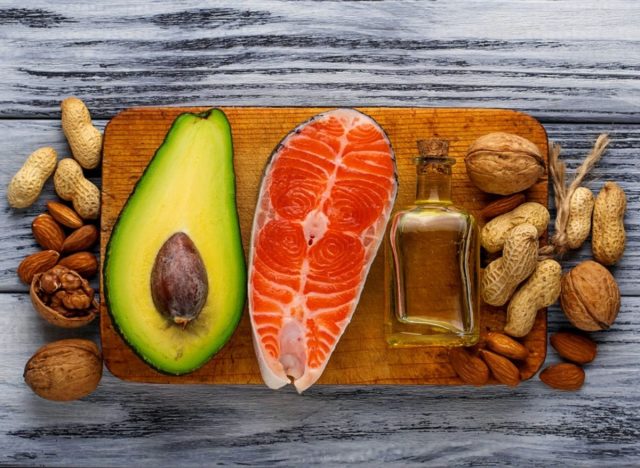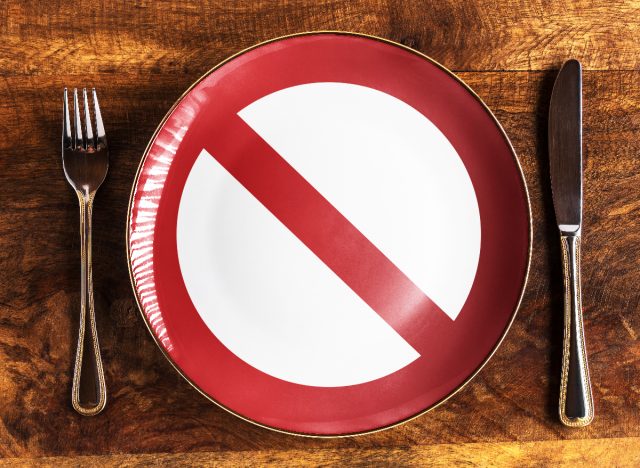9 Surprising Habits That Can Lead to Rapid Weight Gain – Losing weight can be an emotional, tedious process. That’s especially true when the scale creeps up even though you’re seemingly doing everything right. We spoke with the experts about some pretty surprising habits that can lead to rapid weight gain. There are some things you’re doing that may seem “healthy,” but they’re actually derailing you from your weight loss progress. So keep reading to learn more about these sneaky little habits that cause you to gain weight, and next up, be sure to check out The Best Healthy Snacks for Weight Loss

Let’s be honest: Sushi is downright delicious. It’s also considered to be a healthy food by many. But alas, it’s challenging to get your fill of veggies, appetite-suppressing fiber, and satisfying protein when you’re eating sushi rolls, The Nutrition Twins®, Tammy Lakatos Shames, RD, CDN, CFT, and Lyssie Lakatos, RD, CDN, CFT, explain.
“Often when people start eating more sushi, they come home from the meal and are hungry soon after and fill up on high-calorie food, justifying it by thinking that they had a healthy meal,” The Nutrition Twins add. “It’s easy to get too much mercury from fish like tuna and King mackerel and then end up with high levels of mercury in the body, which causes inflammation. Inflammation makes weight gain come on more quickly and makes it harder to lose weight.”

Being mindful of what you put into your body when you’re dieting is all well and good, but you might be overly cautious and restrictive. This can lead to consuming far fewer calories than your body really needs. “The body responds by slowing the metabolism and burning fewer calories to accommodate the ongoing caloric deficit,” The Nutrition Twins explain. “If you feel yourself gain weight quickly or out of nowhere, you’re likely experiencing a metabolic slowdown.”

This is an ultra-sneaky, incredibly common habit you likely wouldn’t associate with weight gain. But The Nutrition Twins warn that your favorite scented body lotions, hair care products, and even cleaning agents that contain fragrance on the ingredients list may also have phthalates, “a class of chemicals” that disturbs your hormones and promotes obesity.
“These chemicals are called obesogens. Often, when weight seems to come on suddenly, toxin overload is to blame,” The Nutrition Twins say. “The good news is that most, if not all, of the products that contain fragrance don’t need to, and you can buy fragrance-free creams, laundry detergents, and cleaning products instead.”

Getting enough solid sleep is a crucial part of your weight loss efforts. If your sleeping habits have changed at all—you’re waking up earlier, sharing a bed with a new fur baby or partner, or moved into a new bedroom that’s not very dark—your quality of sleep can be greatly affected.
According to The Nutrition Twins, “This sleep deprivation results in your body craving energy and you respond by turning to food—and typically the quickest pick-me-up you can find. Sugar and refined carbs give the body instant satisfaction but are calorie-dense and easy to overeat—especially when you’re tired and don’t have the resolve you typically would. After the sugar high, an energy crash sets in, and you crave another pick-me-up, so the vicious sugar cravings cycle and rapid weight gain begin.”
In addition, research shows that a reduction in the amount of deep (REM) sleep or lack of sleep altogether can hinder muscle growth. If you don’t have a lot of lean muscle, your body won’t need as many calories, and you’ll be at a greater chance of putting on excess weight.

You heard that right! Your cute set of new dishes could be to blame for your rapid weight gain. “If you’ve bought new plates and/or glasses and suddenly gain weight, you’re not alone,” The Nutrition Twins tell us. “We’ve found this to be the case for many of our clients. By nature, if you always filled your plate, or fill half of your plate, you continue to do so. If the new plates and glasses are bigger, suddenly, there’s an increase in food and caloric intake that results in a quick weight gain—especially if you’re eating all your meals at home off the bigger plates.”

A common side effect of taking pain medication is dealing with constipation. The inability to get your bowel moving can lead to rapid weight gain, considering all of the food you’ve consumed over the past few days is included in the scale number, The Nutrition Twins say. “The uncomfortable rapid weight gain is typically felt the most in the abdomen as that is where the backup is occurring, and it’s not uncommon to go up a couple of belt sizes. The good news is that you can lose that weight as quickly as you gained it, once you move your bowels,” they add.

Getting your fill of healthy fats is crucial and comes with plenty of health benefits, says Lisa Young, Ph.D., RDN, the author of Finally Full, Finally Slim, a nutritionist in private practice, and a member of our Medical Expert Board. Healthy fats consist of monounsaturated and polyunsaturated fats that help decrease inflammation, boost cholesterol levels, and manage blood sugar. But too much of anything is never a good thing.
“If you eat too many healthy fats this can cause weight gain,” Young explains. “Fats contain more calories per gram than protein or carbohydrates so the calorie intake is higher for fats. Remember that healthy fats in moderation is great.”

Having a tossed salad with fresh veggies is a smart move—but don’t leave out the protein! Adding protein to each meal is critical to help you feel satiated and lose weight. “Protein helps you feel full for longer periods of time, decreasing the amount of food you may eat later in the day,” Young explains. “Research has shown that high-protein diets can reduce body weight and eliminate overeating/unnecessary snacking.”

While you may be under the impression that skipping meals can help you melt excess pounds because you’re cutting out a whole meal’s worth of calories, you’re mistaken. “On the contrary, skipping meals can actually cause weight gain. This is because you become hungry later in the day due to the fact you skipped an important meal,” Young explains.





